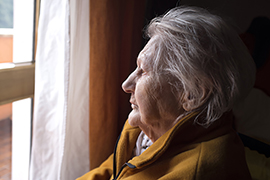- Slug: BC-CNS-Solitary Seniors,630
- Photo available (thumbnail, caption below)
By Megan U. Boyanton
Cronkite News
WASHINGTON – Pick up the phone and give Grandma a call – advocates say more quality time with elderly citizens could help turn around Arizona’s faltering standing in a national report on senior health.
Social seclusion was cited by the experts as one of the biggest factors affecting senior health, along with poor access to healthy food and a lack of community support.
Those factors combined to drop Arizona to 31st in a report last year on senior health by the United Health Foundation, down from 24th place in 2013.
“We have many seniors who are very isolated,” said Deborah Schaus, chief executive officer of East Valley Adult Resources. “They really are on their own now, far from family.”
The report measured everything from behaviors like smoking to prescription drug coverage to the number of home health care workers in the state.
Arizona did relatively well for senior behaviors, such as physical activity and low geriatric obesity rates. It was second in the nation for both its high percentage of hospice care users and low number of hospital deaths.
But the state fell short in several areas, including an absence of dedicated health care providers, low rates of flu vaccination coverage and significant intakes in intensive care units.
Looming over it all was social seclusion of seniors, a problem Schaus compared to the impact of “smoking 15 cigarettes a day.”
The impact is particularly evident in rural areas like Apache, Navajo and Graham counties: The report identified those three as high-risk areas for senior social isolation, where elderly adults are more likely to be alone, in poverty or living with disabilities.
A representative of the Northern Arizona Council of Governments Area Agency on Aging said the problem is aggravated by limited transportation options in rural counties.
“That portion of Arizona has areas that are frontier, where there is no local government to assist them,” Assistant Director Michael Burrington said. “It is difficult to find resources, to find caregivers or even to get transportation for them and deliver meals.”
He added that lack of mobility also means trouble accessing hospitals, doctors’ offices and senior centers.
And in a state with more than 1 million people over age 65, the problem is not limited to rural areas. Debra McPherson said she has seen seniors develop depression, withdrawing themselves from society.
“Sometimes, people are better off in an assisted living setting because there’s more social opportunities,” said McPherson, a nurse and owner of Arizona Care Advocates. “When you’re at home and all you see is a caregiver 24 hours a day, and you can’t get out, it is social isolation.”
Elyse Guidas suggests one possible solution: access to healthy food. Guidas is executive director of Discovery Triangle Development Corp., a nonprofit that works to bring healthy food to people in “food deserts.”
“One thing that gets overlooked in this conversation a lot is what food does to build community,” Guidas said. “Seniors specifically, they experience some loneliness and neglect, and food is a great opportunity to connect them.”
She said the state is a hotbed for food deserts, areas where “healthy food access” is a challenge.
Guidas explained that a grocery store located miles away could pose difficulties to residents without reliable transportation. Factor in the heat and sprawling development – both common in Arizona – and the problem is exacerbated for seniors, she said.
No quick fix will do, Schaus said, as the elderly population only continues to grow. Instead, she believes the answer for long-term success is in the hands of Arizonans.
“We need to keep our older adult neighbors in mind here in Arizona,” Schaus said. “With that state of isolation among so many of our seniors, we all have to come together and find some ways to create community.”
For more stories from Cronkite News, visit cronkitenews.azpbs.org.
^__=
Web links:
_ Report: https://assets.americashealthrankings.org/app/uploads/ahr-senior-report_2019_final.pdf
_ Arizona stats: https://assets.americashealthrankings.org/app/uploads/arizona-senior-socialisolation-2019.pdf
_ 65+ population: https://www.census.gov/quickfacts/AZ
^__=
Senior citizens face a number of challenges, particularly in rural areas, but experts say one problem that is often overlooked is the problem of senior isolation. (Photo by giocalde,Penn State/Creative Commons)
